Database Manager Resume Examples

Jul 18, 2024
|
12 min read
Database manager resume guide: Unlock your next job with these tips. Learn how to highlight your SQL skills and project management experience to stand out. Make your resume data-driven and error-free.
Rated by 348 people
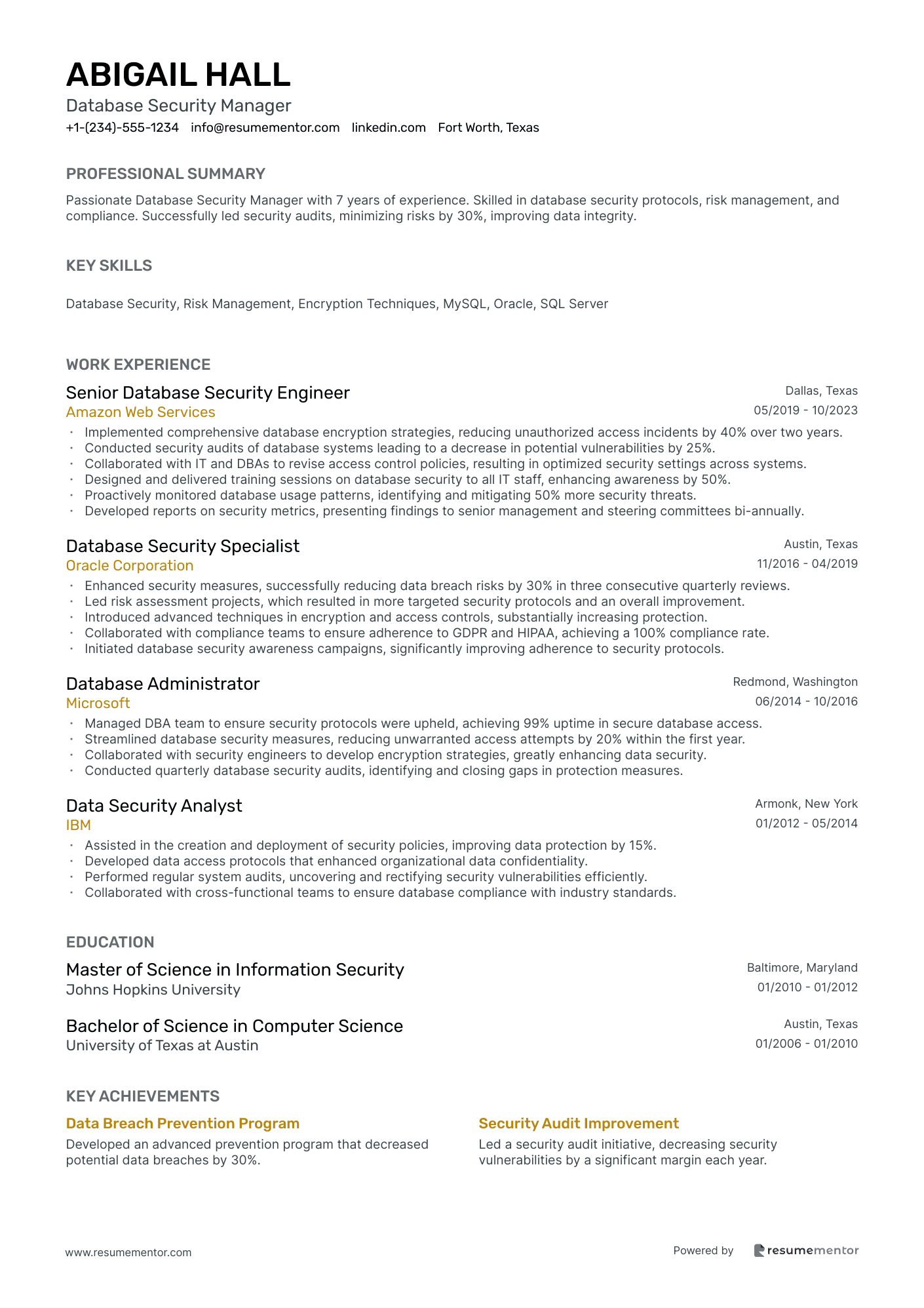
Database Security Manager
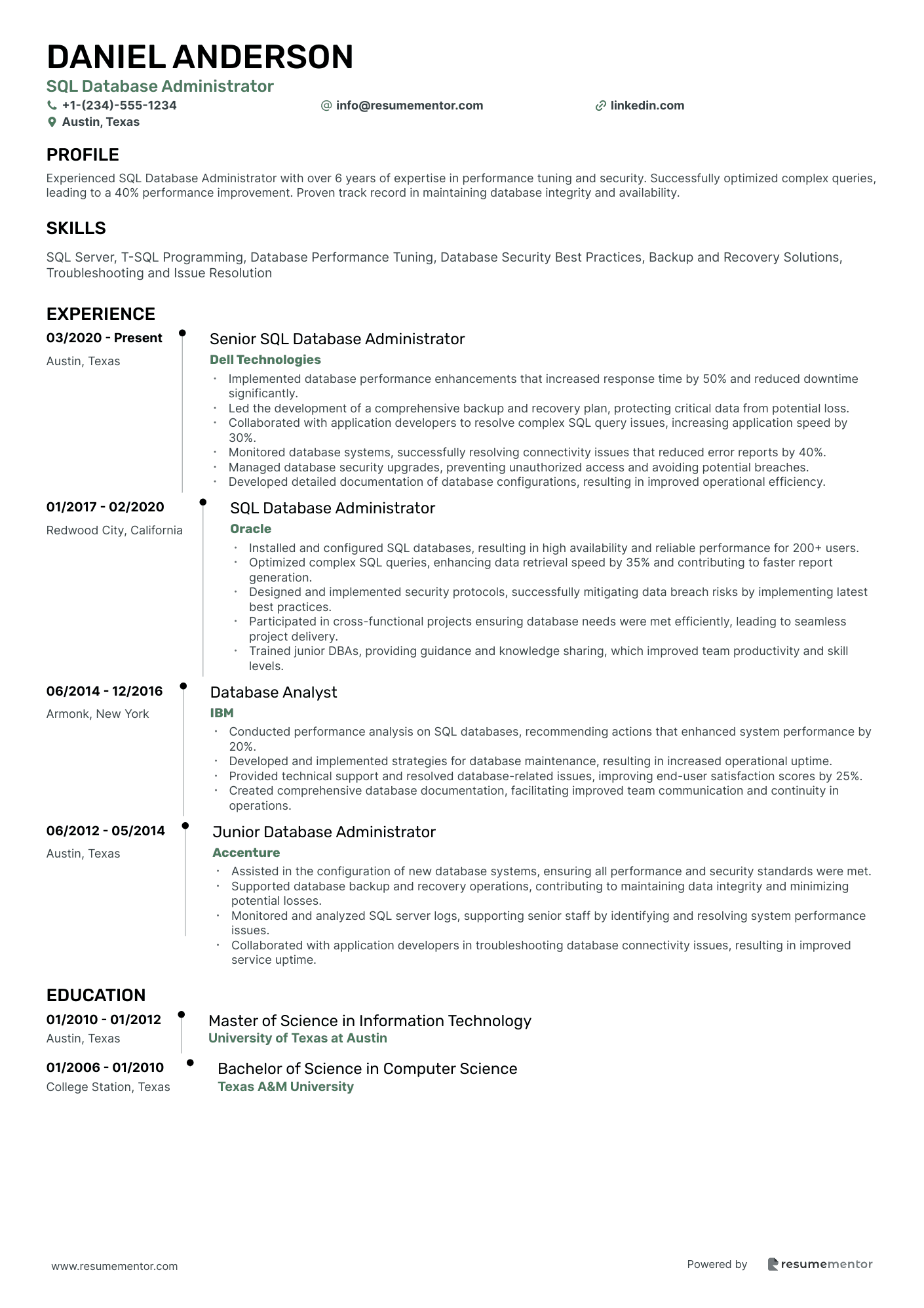
SQL Database Administrator
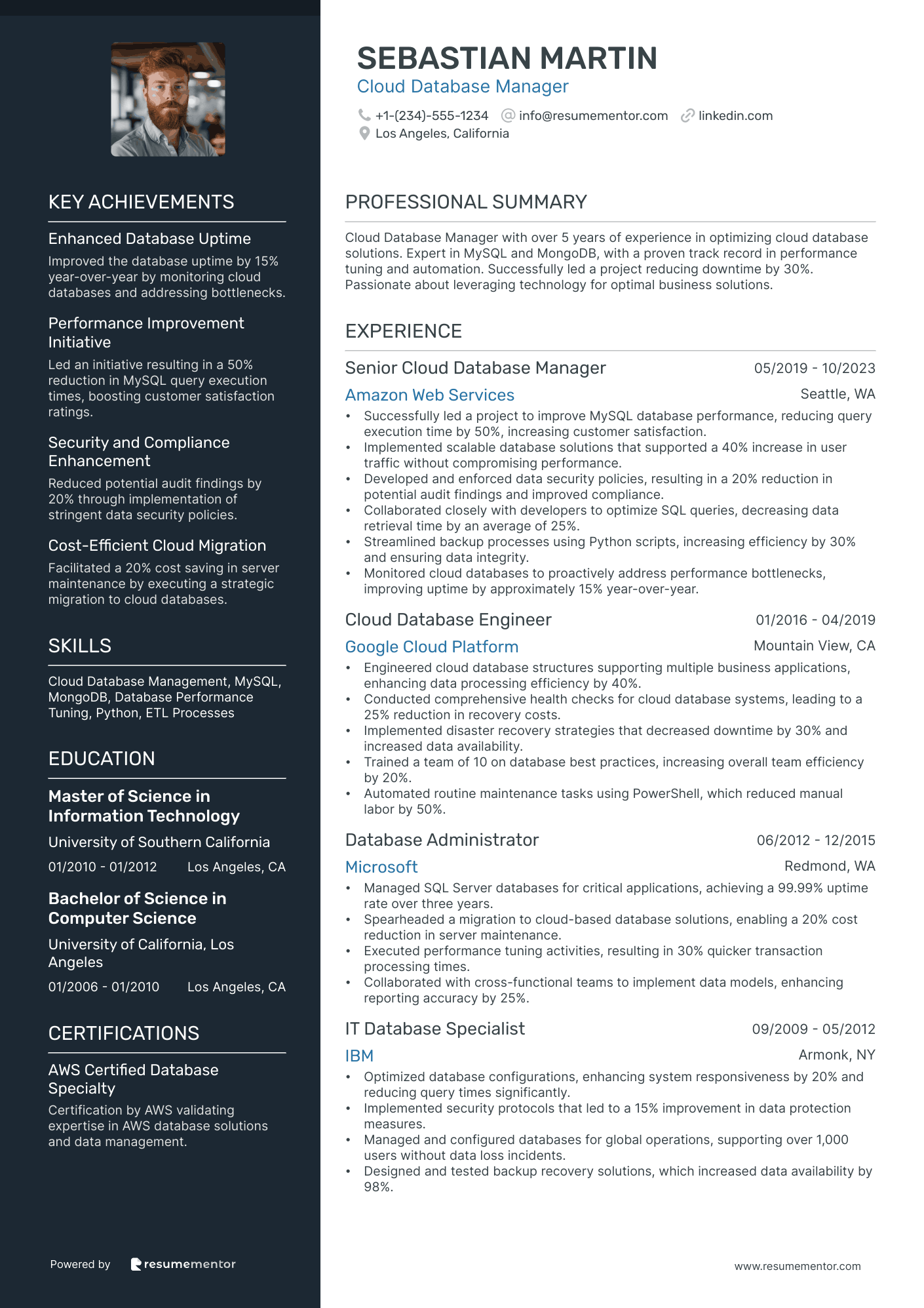
Cloud Database Manager
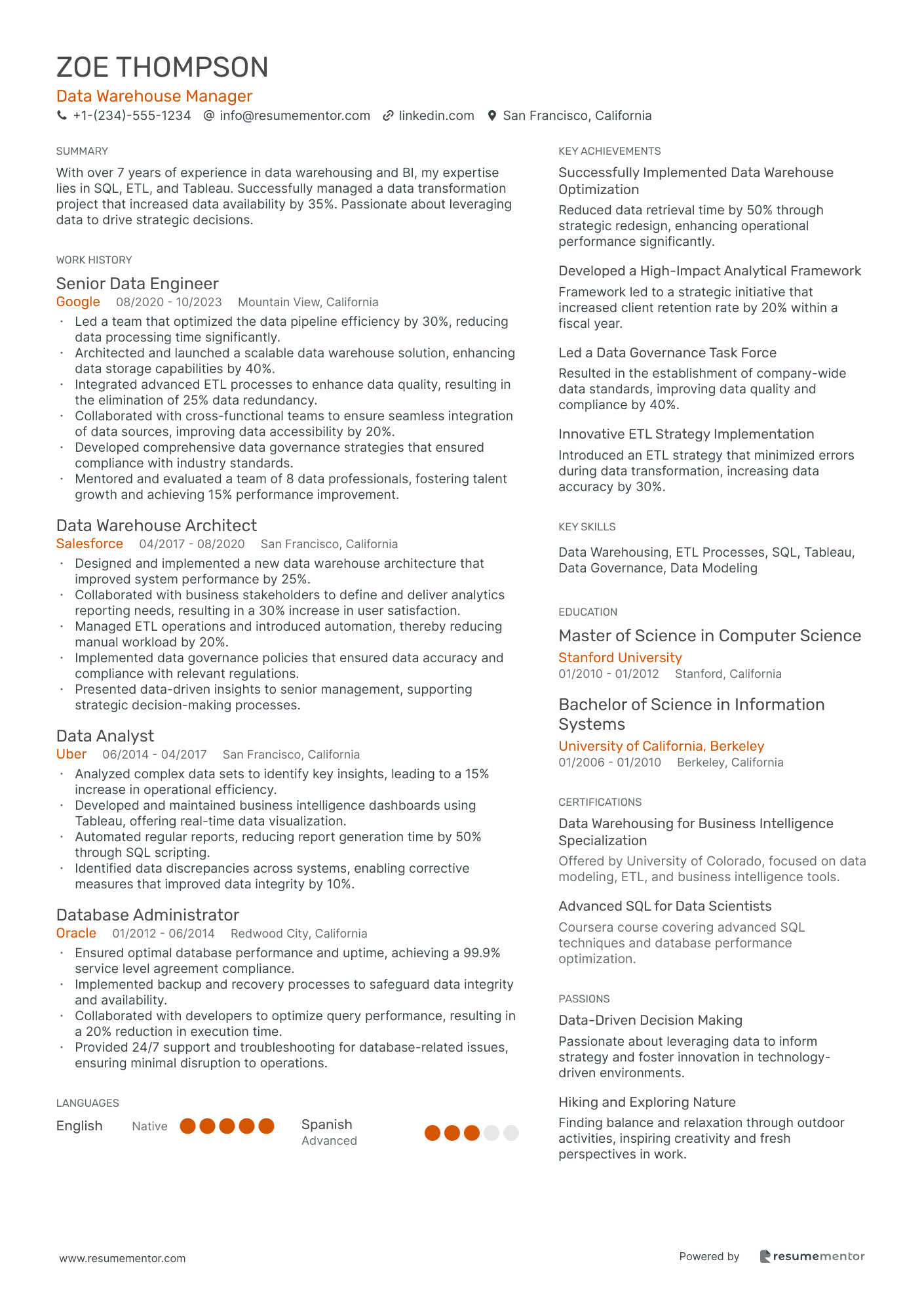
Data Warehouse Manager
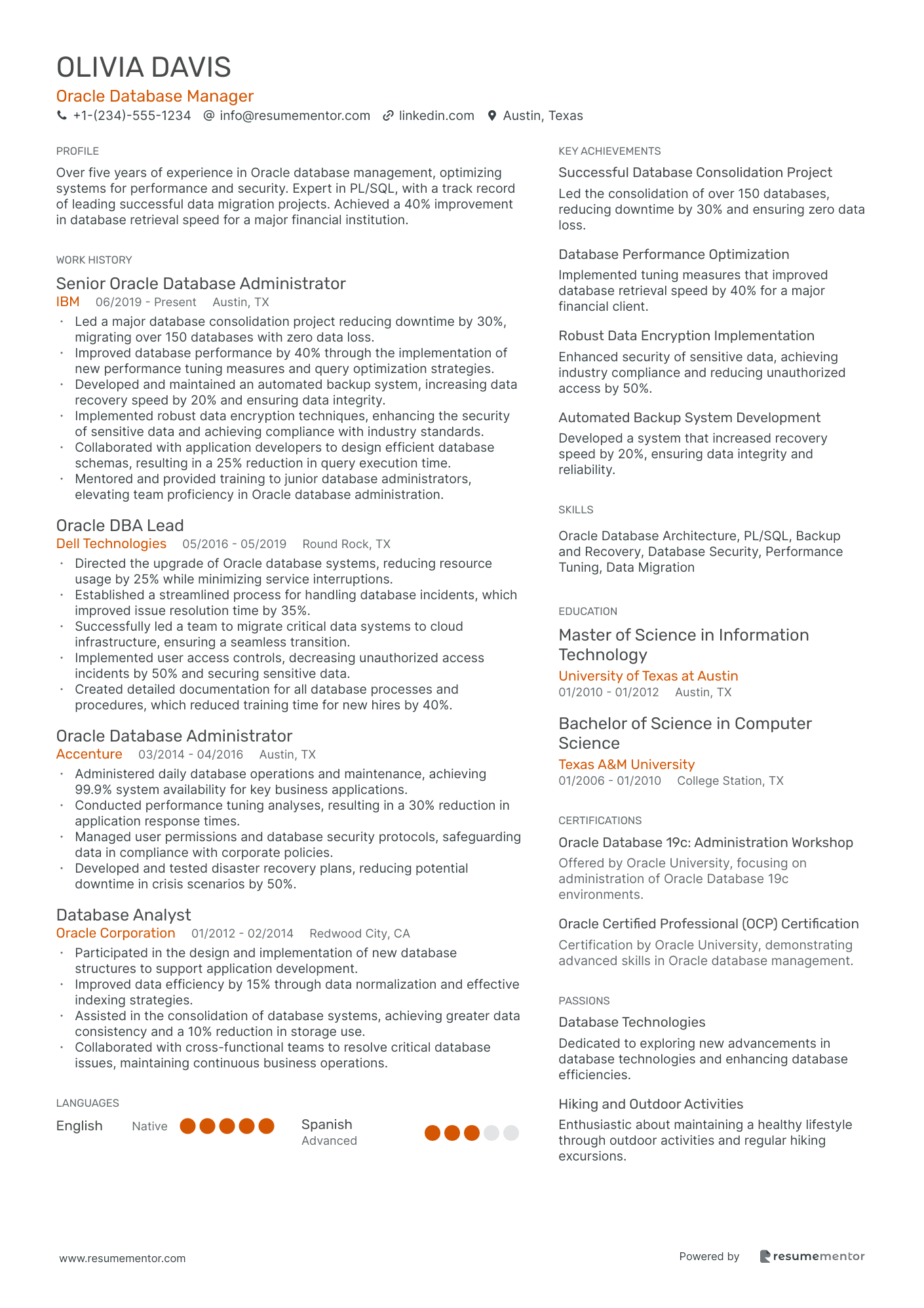
Oracle Database Manager
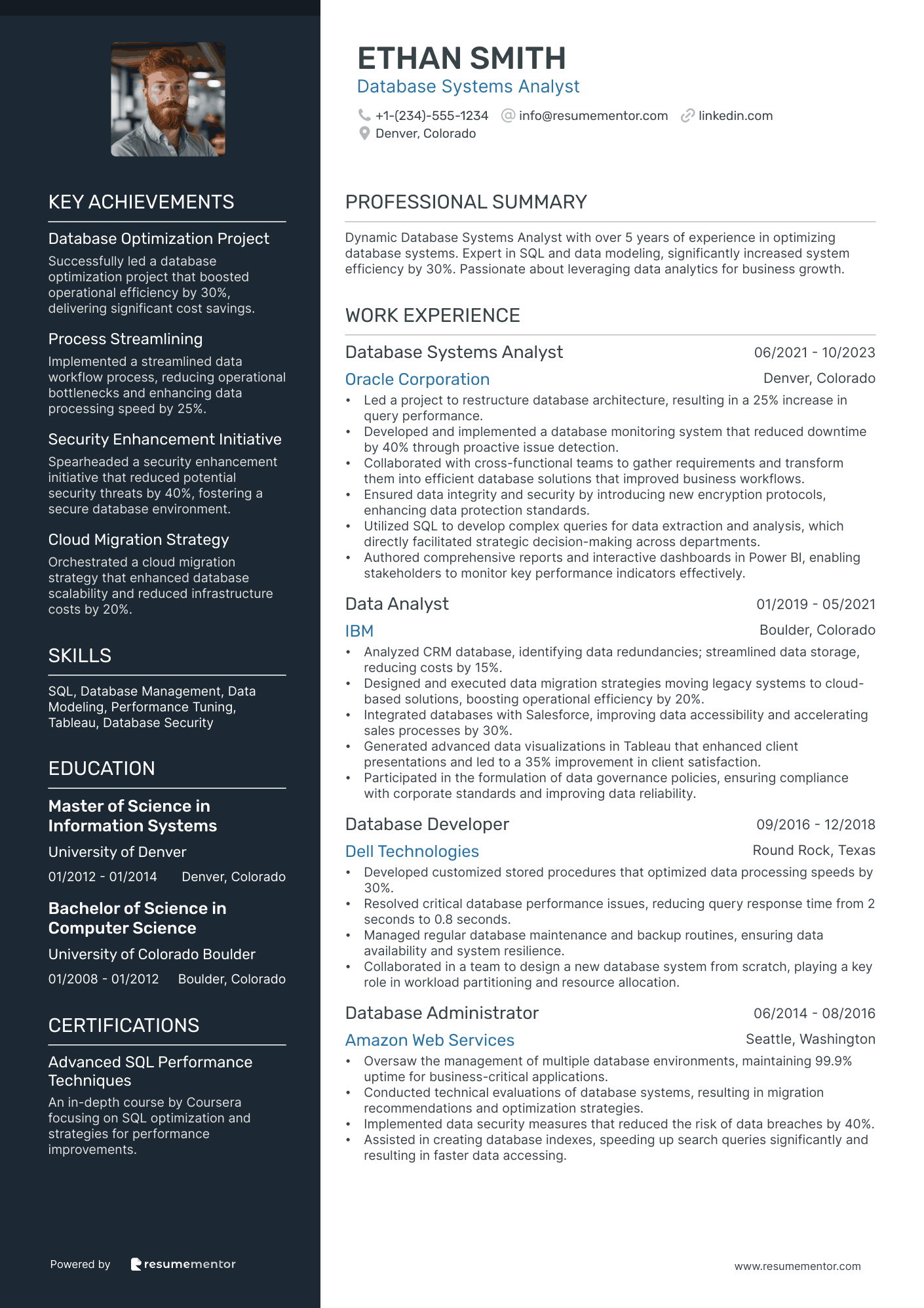
Database Systems Analyst
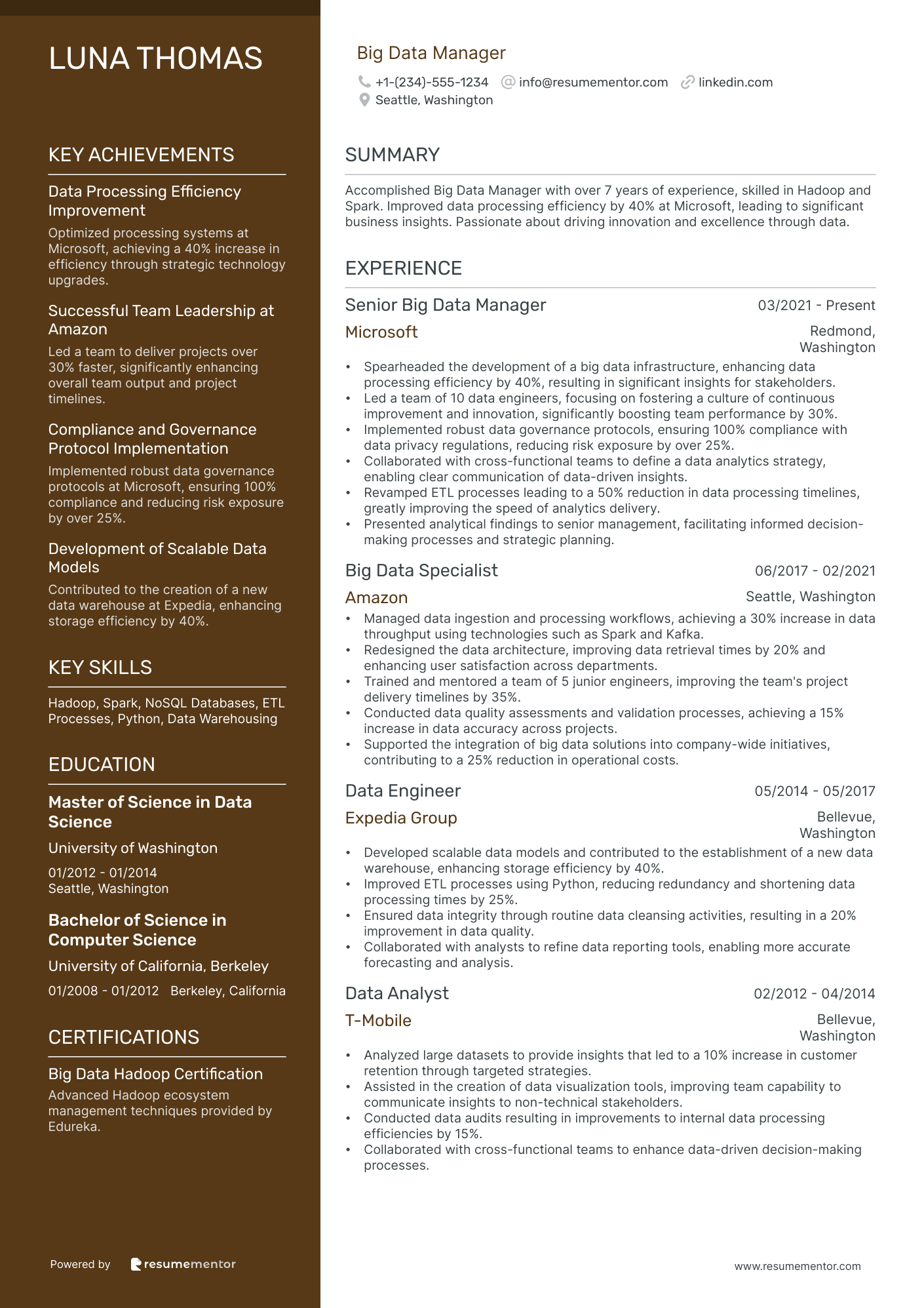
Big Data Manager
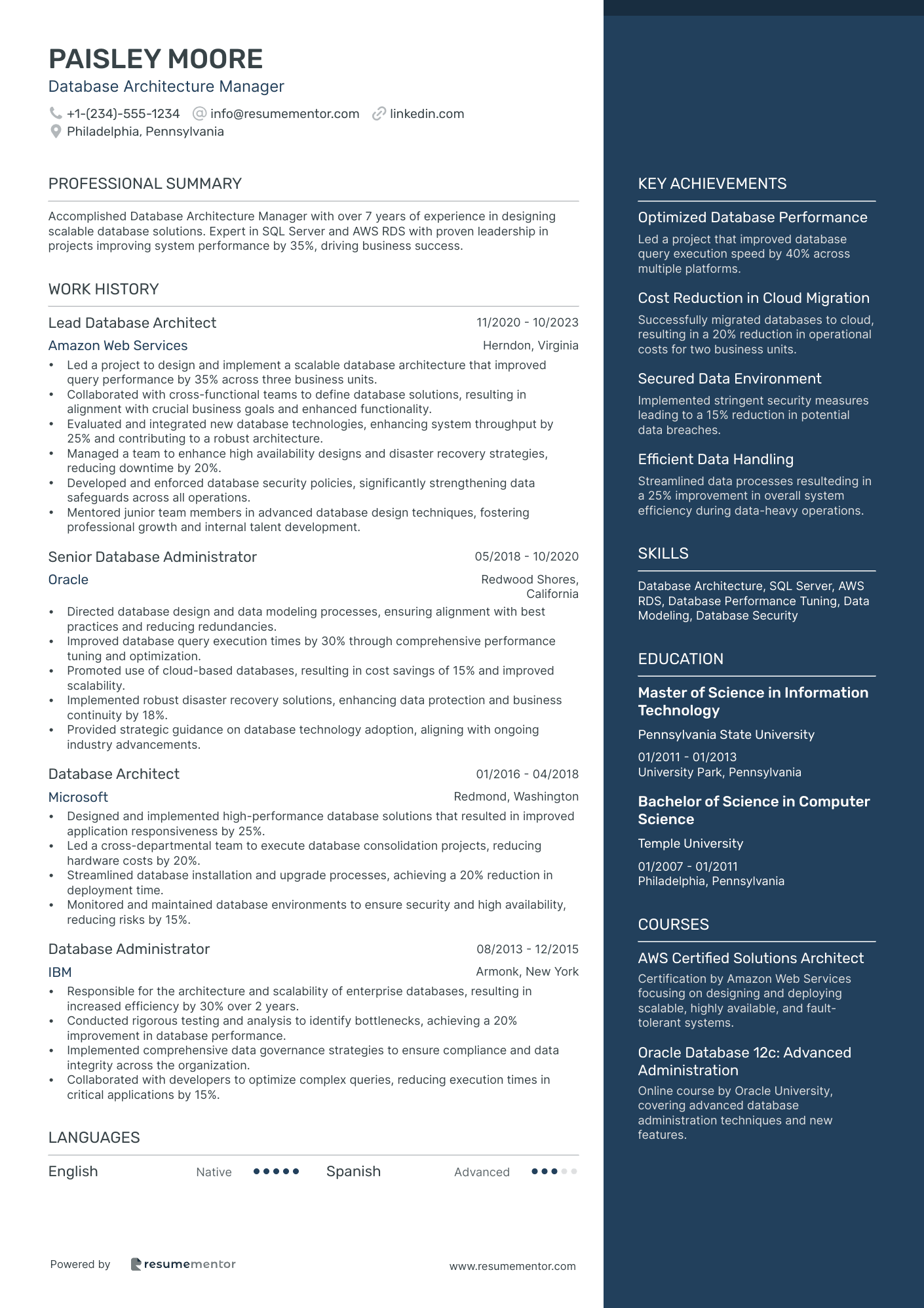
Database Architecture Manager
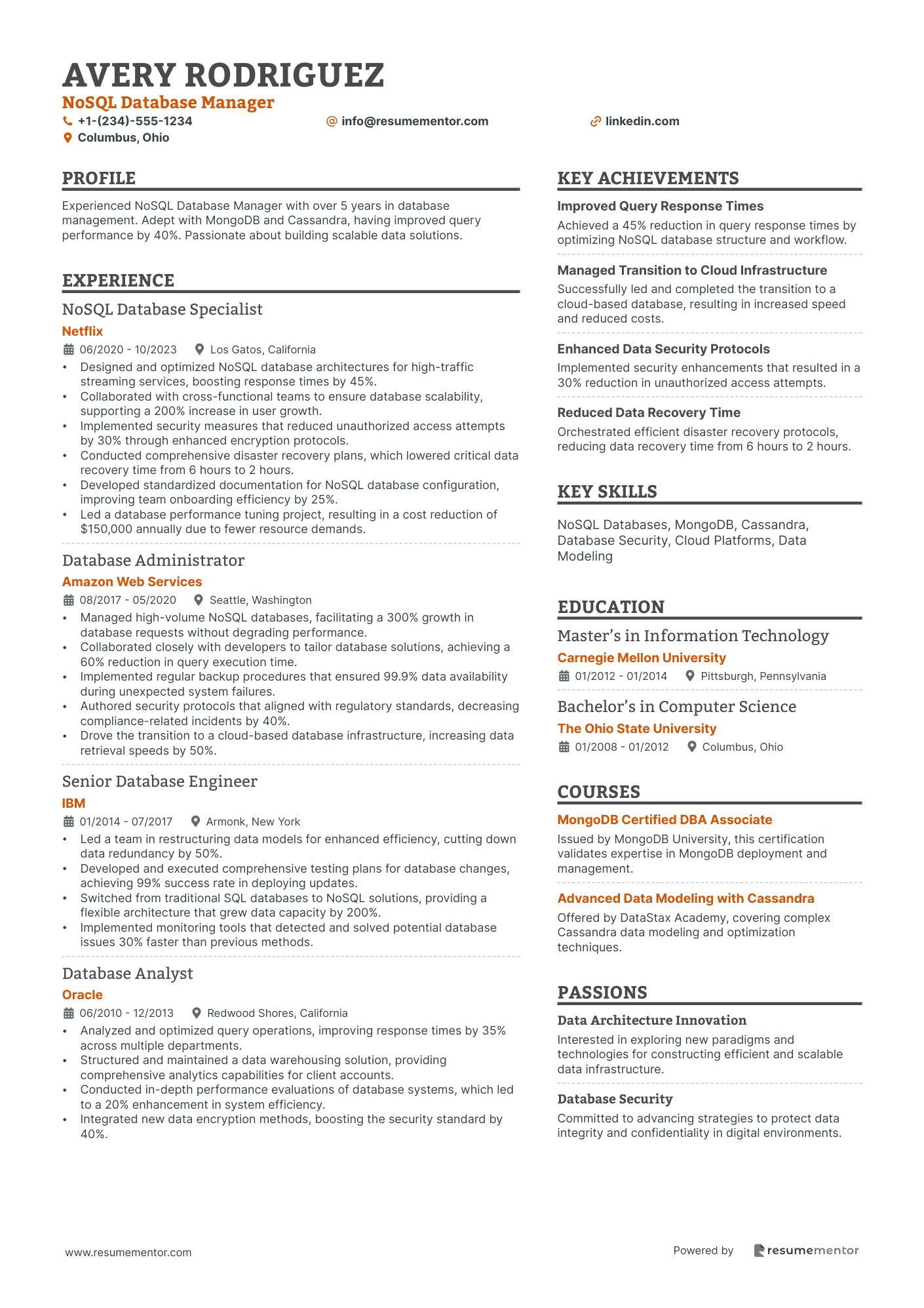
NoSQL Database Manager

Database Security Manager resume sample
- •Implemented comprehensive database encryption strategies, reducing unauthorized access incidents by 40% over two years.
- •Conducted security audits of database systems leading to a decrease in potential vulnerabilities by 25%.
- •Collaborated with IT and DBAs to revise access control policies, resulting in optimized security settings across systems.
- •Designed and delivered training sessions on database security to all IT staff, enhancing awareness by 50%.
- •Proactively monitored database usage patterns, identifying and mitigating 50% more security threats.
- •Developed reports on security metrics, presenting findings to senior management and steering committees bi-annually.
- •Enhanced security measures, successfully reducing data breach risks by 30% in three consecutive quarterly reviews.
- •Led risk assessment projects, which resulted in more targeted security protocols and an overall improvement.
- •Introduced advanced techniques in encryption and access controls, substantially increasing protection.
- •Collaborated with compliance teams to ensure adherence to GDPR and HIPAA, achieving a 100% compliance rate.
- •Initiated database security awareness campaigns, significantly improving adherence to security protocols.
- •Managed DBA team to ensure security protocols were upheld, achieving 99% uptime in secure database access.
- •Streamlined database security measures, reducing unwarranted access attempts by 20% within the first year.
- •Collaborated with security engineers to develop encryption strategies, greatly enhancing data security.
- •Conducted quarterly database security audits, identifying and closing gaps in protection measures.
- •Assisted in the creation and deployment of security policies, improving data protection by 15%.
- •Developed data access protocols that enhanced organizational data confidentiality.
- •Performed regular system audits, uncovering and rectifying security vulnerabilities efficiently.
- •Collaborated with cross-functional teams to ensure database compliance with industry standards.
SQL Database Administrator resume sample
- •Implemented database performance enhancements that increased response time by 50% and reduced downtime significantly.
- •Led the development of a comprehensive backup and recovery plan, protecting critical data from potential loss.
- •Collaborated with application developers to resolve complex SQL query issues, increasing application speed by 30%.
- •Monitored database systems, successfully resolving connectivity issues that reduced error reports by 40%.
- •Managed database security upgrades, preventing unauthorized access and avoiding potential breaches.
- •Developed detailed documentation of database configurations, resulting in improved operational efficiency.
- •Installed and configured SQL databases, resulting in high availability and reliable performance for 200+ users.
- •Optimized complex SQL queries, enhancing data retrieval speed by 35% and contributing to faster report generation.
- •Designed and implemented security protocols, successfully mitigating data breach risks by implementing latest best practices.
- •Participated in cross-functional projects ensuring database needs were met efficiently, leading to seamless project delivery.
- •Trained junior DBAs, providing guidance and knowledge sharing, which improved team productivity and skill levels.
- •Conducted performance analysis on SQL databases, recommending actions that enhanced system performance by 20%.
- •Developed and implemented strategies for database maintenance, resulting in increased operational uptime.
- •Provided technical support and resolved database-related issues, improving end-user satisfaction scores by 25%.
- •Created comprehensive database documentation, facilitating improved team communication and continuity in operations.
- •Assisted in the configuration of new database systems, ensuring all performance and security standards were met.
- •Supported database backup and recovery operations, contributing to maintaining data integrity and minimizing potential losses.
- •Monitored and analyzed SQL server logs, supporting senior staff by identifying and resolving system performance issues.
- •Collaborated with application developers in troubleshooting database connectivity issues, resulting in improved service uptime.
Cloud Database Manager resume sample
- •Successfully led a project to improve MySQL database performance, reducing query execution time by 50%, increasing customer satisfaction.
- •Implemented scalable database solutions that supported a 40% increase in user traffic without compromising performance.
- •Developed and enforced data security policies, resulting in a 20% reduction in potential audit findings and improved compliance.
- •Collaborated closely with developers to optimize SQL queries, decreasing data retrieval time by an average of 25%.
- •Streamlined backup processes using Python scripts, increasing efficiency by 30% and ensuring data integrity.
- •Monitored cloud databases to proactively address performance bottlenecks, improving uptime by approximately 15% year-over-year.
- •Engineered cloud database structures supporting multiple business applications, enhancing data processing efficiency by 40%.
- •Conducted comprehensive health checks for cloud database systems, leading to a 25% reduction in recovery costs.
- •Implemented disaster recovery strategies that decreased downtime by 30% and increased data availability.
- •Trained a team of 10 on database best practices, increasing overall team efficiency by 20%.
- •Automated routine maintenance tasks using PowerShell, which reduced manual labor by 50%.
- •Managed SQL Server databases for critical applications, achieving a 99.99% uptime rate over three years.
- •Spearheaded a migration to cloud-based database solutions, enabling a 20% cost reduction in server maintenance.
- •Executed performance tuning activities, resulting in 30% quicker transaction processing times.
- •Collaborated with cross-functional teams to implement data models, enhancing reporting accuracy by 25%.
- •Optimized database configurations, enhancing system responsiveness by 20% and reducing query times significantly.
- •Implemented security protocols that led to a 15% improvement in data protection measures.
- •Managed and configured databases for global operations, supporting over 1,000 users without data loss incidents.
- •Designed and tested backup recovery solutions, which increased data availability by 98%.
Data Warehouse Manager resume sample
- •Led a team that optimized the data pipeline efficiency by 30%, reducing data processing time significantly.
- •Architected and launched a scalable data warehouse solution, enhancing data storage capabilities by 40%.
- •Integrated advanced ETL processes to enhance data quality, resulting in the elimination of 25% data redundancy.
- •Collaborated with cross-functional teams to ensure seamless integration of data sources, improving data accessibility by 20%.
- •Developed comprehensive data governance strategies that ensured compliance with industry standards.
- •Mentored and evaluated a team of 8 data professionals, fostering talent growth and achieving 15% performance improvement.
- •Designed and implemented a new data warehouse architecture that improved system performance by 25%.
- •Collaborated with business stakeholders to define and deliver analytics reporting needs, resulting in a 30% increase in user satisfaction.
- •Managed ETL operations and introduced automation, thereby reducing manual workload by 20%.
- •Implemented data governance policies that ensured data accuracy and compliance with relevant regulations.
- •Presented data-driven insights to senior management, supporting strategic decision-making processes.
- •Analyzed complex data sets to identify key insights, leading to a 15% increase in operational efficiency.
- •Developed and maintained business intelligence dashboards using Tableau, offering real-time data visualization.
- •Automated regular reports, reducing report generation time by 50% through SQL scripting.
- •Identified data discrepancies across systems, enabling corrective measures that improved data integrity by 10%.
- •Ensured optimal database performance and uptime, achieving a 99.9% service level agreement compliance.
- •Implemented backup and recovery processes to safeguard data integrity and availability.
- •Collaborated with developers to optimize query performance, resulting in a 20% reduction in execution time.
- •Provided 24/7 support and troubleshooting for database-related issues, ensuring minimal disruption to operations.
Oracle Database Manager resume sample
- •Led a major database consolidation project reducing downtime by 30%, migrating over 150 databases with zero data loss.
- •Improved database performance by 40% through the implementation of new performance tuning measures and query optimization strategies.
- •Developed and maintained an automated backup system, increasing data recovery speed by 20% and ensuring data integrity.
- •Implemented robust data encryption techniques, enhancing the security of sensitive data and achieving compliance with industry standards.
- •Collaborated with application developers to design efficient database schemas, resulting in a 25% reduction in query execution time.
- •Mentored and provided training to junior database administrators, elevating team proficiency in Oracle database administration.
- •Directed the upgrade of Oracle database systems, reducing resource usage by 25% while minimizing service interruptions.
- •Established a streamlined process for handling database incidents, which improved issue resolution time by 35%.
- •Successfully led a team to migrate critical data systems to cloud infrastructure, ensuring a seamless transition.
- •Implemented user access controls, decreasing unauthorized access incidents by 50% and securing sensitive data.
- •Created detailed documentation for all database processes and procedures, which reduced training time for new hires by 40%.
- •Administered daily database operations and maintenance, achieving 99.9% system availability for key business applications.
- •Conducted performance tuning analyses, resulting in a 30% reduction in application response times.
- •Managed user permissions and database security protocols, safeguarding data in compliance with corporate policies.
- •Developed and tested disaster recovery plans, reducing potential downtime in crisis scenarios by 50%.
- •Participated in the design and implementation of new database structures to support application development.
- •Improved data efficiency by 15% through data normalization and effective indexing strategies.
- •Assisted in the consolidation of database systems, achieving greater data consistency and a 10% reduction in storage use.
- •Collaborated with cross-functional teams to resolve critical database issues, maintaining continuous business operations.
Database Systems Analyst resume sample
- •Led a project to restructure database architecture, resulting in a 25% increase in query performance.
- •Developed and implemented a database monitoring system that reduced downtime by 40% through proactive issue detection.
- •Collaborated with cross-functional teams to gather requirements and transform them into efficient database solutions that improved business workflows.
- •Ensured data integrity and security by introducing new encryption protocols, enhancing data protection standards.
- •Utilized SQL to develop complex queries for data extraction and analysis, which directly facilitated strategic decision-making across departments.
- •Authored comprehensive reports and interactive dashboards in Power BI, enabling stakeholders to monitor key performance indicators effectively.
- •Analyzed CRM database, identifying data redundancies; streamlined data storage, reducing costs by 15%.
- •Designed and executed data migration strategies moving legacy systems to cloud-based solutions, boosting operational efficiency by 20%.
- •Integrated databases with Salesforce, improving data accessibility and accelerating sales processes by 30%.
- •Generated advanced data visualizations in Tableau that enhanced client presentations and led to a 35% improvement in client satisfaction.
- •Participated in the formulation of data governance policies, ensuring compliance with corporate standards and improving data reliability.
- •Developed customized stored procedures that optimized data processing speeds by 30%.
- •Resolved critical database performance issues, reducing query response time from 2 seconds to 0.8 seconds.
- •Managed regular database maintenance and backup routines, ensuring data availability and system resilience.
- •Collaborated in a team to design a new database system from scratch, playing a key role in workload partitioning and resource allocation.
- •Oversaw the management of multiple database environments, maintaining 99.9% uptime for business-critical applications.
- •Conducted technical evaluations of database systems, resulting in migration recommendations and optimization strategies.
- •Implemented data security measures that reduced the risk of data breaches by 40%.
- •Assisted in creating database indexes, speeding up search queries significantly and resulting in faster data accessing.
Big Data Manager resume sample
- •Spearheaded the development of a big data infrastructure, enhancing data processing efficiency by 40%, resulting in significant insights for stakeholders.
- •Led a team of 10 data engineers, focusing on fostering a culture of continuous improvement and innovation, significantly boosting team performance by 30%.
- •Implemented robust data governance protocols, ensuring 100% compliance with data privacy regulations, reducing risk exposure by over 25%.
- •Collaborated with cross-functional teams to define a data analytics strategy, enabling clear communication of data-driven insights.
- •Revamped ETL processes leading to a 50% reduction in data processing timelines, greatly improving the speed of analytics delivery.
- •Presented analytical findings to senior management, facilitating informed decision-making processes and strategic planning.
- •Managed data ingestion and processing workflows, achieving a 30% increase in data throughput using technologies such as Spark and Kafka.
- •Redesigned the data architecture, improving data retrieval times by 20% and enhancing user satisfaction across departments.
- •Trained and mentored a team of 5 junior engineers, improving the team's project delivery timelines by 35%.
- •Conducted data quality assessments and validation processes, achieving a 15% increase in data accuracy across projects.
- •Supported the integration of big data solutions into company-wide initiatives, contributing to a 25% reduction in operational costs.
- •Developed scalable data models and contributed to the establishment of a new data warehouse, enhancing storage efficiency by 40%.
- •Improved ETL processes using Python, reducing redundancy and shortening data processing times by 25%.
- •Ensured data integrity through routine data cleansing activities, resulting in a 20% improvement in data quality.
- •Collaborated with analysts to refine data reporting tools, enabling more accurate forecasting and analysis.
- •Analyzed large datasets to provide insights that led to a 10% increase in customer retention through targeted strategies.
- •Assisted in the creation of data visualization tools, improving team capability to communicate insights to non-technical stakeholders.
- •Conducted data audits resulting in improvements to internal data processing efficiencies by 15%.
- •Collaborated with cross-functional teams to enhance data-driven decision-making processes.
Database Architecture Manager resume sample
- •Led a project to design and implement a scalable database architecture that improved query performance by 35% across three business units.
- •Collaborated with cross-functional teams to define database solutions, resulting in alignment with crucial business goals and enhanced functionality.
- •Evaluated and integrated new database technologies, enhancing system throughput by 25% and contributing to a robust architecture.
- •Managed a team to enhance high availability designs and disaster recovery strategies, reducing downtime by 20%.
- •Developed and enforced database security policies, significantly strengthening data safeguards across all operations.
- •Mentored junior team members in advanced database design techniques, fostering professional growth and internal talent development.
- •Directed database design and data modeling processes, ensuring alignment with best practices and reducing redundancies.
- •Improved database query execution times by 30% through comprehensive performance tuning and optimization.
- •Promoted use of cloud-based databases, resulting in cost savings of 15% and improved scalability.
- •Implemented robust disaster recovery solutions, enhancing data protection and business continuity by 18%.
- •Provided strategic guidance on database technology adoption, aligning with ongoing industry advancements.
- •Designed and implemented high-performance database solutions that resulted in improved application responsiveness by 25%.
- •Led a cross-departmental team to execute database consolidation projects, reducing hardware costs by 20%.
- •Streamlined database installation and upgrade processes, achieving a 20% reduction in deployment time.
- •Monitored and maintained database environments to ensure security and high availability, reducing risks by 15%.
- •Responsible for the architecture and scalability of enterprise databases, resulting in increased efficiency by 30% over 2 years.
- •Conducted rigorous testing and analysis to identify bottlenecks, achieving a 20% improvement in database performance.
- •Implemented comprehensive data governance strategies to ensure compliance and data integrity across the organization.
- •Collaborated with developers to optimize complex queries, reducing execution times in critical applications by 15%.
NoSQL Database Manager resume sample
- •Designed and optimized NoSQL database architectures for high-traffic streaming services, boosting response times by 45%.
- •Collaborated with cross-functional teams to ensure database scalability, supporting a 200% increase in user growth.
- •Implemented security measures that reduced unauthorized access attempts by 30% through enhanced encryption protocols.
- •Conducted comprehensive disaster recovery plans, which lowered critical data recovery time from 6 hours to 2 hours.
- •Developed standardized documentation for NoSQL database configuration, improving team onboarding efficiency by 25%.
- •Led a database performance tuning project, resulting in a cost reduction of $150,000 annually due to fewer resource demands.
- •Managed high-volume NoSQL databases, facilitating a 300% growth in database requests without degrading performance.
- •Collaborated closely with developers to tailor database solutions, achieving a 60% reduction in query execution time.
- •Implemented regular backup procedures that ensured 99.9% data availability during unexpected system failures.
- •Authored security protocols that aligned with regulatory standards, decreasing compliance-related incidents by 40%.
- •Drove the transition to a cloud-based database infrastructure, increasing data retrieval speeds by 50%.
- •Led a team in restructuring data models for enhanced efficiency, cutting down data redundancy by 50%.
- •Developed and executed comprehensive testing plans for database changes, achieving 99% success rate in deploying updates.
- •Switched from traditional SQL databases to NoSQL solutions, providing a flexible architecture that grew data capacity by 200%.
- •Implemented monitoring tools that detected and solved potential database issues 30% faster than previous methods.
- •Analyzed and optimized query operations, improving response times by 35% across multiple departments.
- •Structured and maintained a data warehousing solution, providing comprehensive analytics capabilities for client accounts.
- •Conducted in-depth performance evaluations of database systems, which led to a 20% enhancement in system efficiency.
- •Integrated new data encryption methods, boosting the security standard by 40%.
As a database manager, crafting your resume may feel like organizing a digital library where every skill finds its rightful place. It's crucial to translate your technical expertise into simple words while highlighting your essential role in security management. This combination of clarity and detail helps your resume stand out to potential employers.
Understanding what employers seek and aligning your experience with their needs can set you apart in a competitive field. You want them to see how your work impacts business decisions and why you would be an asset.
To achieve this, consider using a resume template to guide your structure. A customizable template helps you present your achievements and skills in a compelling way that underscores your organizational and tech-savvy traits—vital for any successful database manager.
By starting with a strong format, you can focus on effectively showcasing your contributions to past projects. This, in turn, illustrates how your database management skills can drive a company's success. A well-organized resume opens doors, and with thoughtful crafting, you can clearly communicate your value and make it easy for employers to see why you're the right choice.
Key Takeaways
- To create a standout database manager resume, effectively communicate your technical expertise in managing and optimizing databases, with an emphasis on data integrity and security.
- Use a reverse-chronological format to present your professional experience, which highlights your most recent and relevant job successes and technical skills.
- Incorporate a professional summary that clearly showcases your technical strengths and specific achievements, like system performance improvements, to provide concrete proof of your value.
- Include both hard and soft skills, such as SQL proficiency, database design, communication, and leadership, to demonstrate a well-rounded skill set crucial for database management roles.
- Supplement your resume with additional sections, like certifications, language skills, volunteer work, or relevant projects, to present a comprehensive and well-rounded professional profile.
What to focus on when writing your database manager resume
Your database manager resume should clearly communicate your expertise in managing and optimizing databases, with a focus on maintaining both data integrity and security. This will catch the recruiter's attention by showcasing your strengths in database management systems and your adeptness in solving problems and leading teams effectively.
How to structure your database manager resume
- Contact Information: Start with your full name, phone number, email address, and LinkedIn profile—ensuring that recruiters can easily reach out to you is critical for making a good first impression.
- Professional Summary: Use this section to provide a compelling snapshot of your career—emphasize your skills with database systems like SQL Server or Oracle, and showcase your expertise in areas like database architecture and performance tuning.
- Technical Skills: Here, list the specific tools and software you're proficient with, such as MySQL, data warehousing solutions, or advanced security measures—highlighting your technical prowess is essential to show you're equipped for the demands of the role.
- Work Experience: Detail your past job roles, emphasizing how you achieved tangible results like improved database efficiency or reduced downtime—this section is where you illustrate your ability to manage large datasets and complex database environments.
- Education: Support your work experience by listing your degrees, any relevant certifications like Oracle Certified Professional, and notable coursework—showing a strong educational background helps validate your technical skills.
- Projects and Achievements: Share specific projects where your skills had a significant impact, such as improving data governance practices or successfully facilitating a complex data migration—showcasing your accomplishments can differentiate you from other candidates.
Finally, consider adding sections for awards, volunteer work, or publications to further illustrate your valuable contributions to the field of database management—below, we'll cover each section more in-depth and discuss how to format your resume for maximum impact.
Which resume format to choose
As a database manager, selecting the right resume format is essential to showcasing your technical skills effectively. The reverse chronological format is widely recommended because it presents your career path in a clear sequence, highlighting your most recent and relevant experiences first. This is particularly important in technical fields where staying updated with the latest technologies and trends is crucial. Hiring managers can quickly assess your professional growth and recognize the depth of your experience.
When choosing the font for your resume, consider how it complements your professional image. Fonts like Raleway, Montserrat, or Lato offer a modern and clean look that aligns well with the tech industry’s aesthetic. These fonts not only enhance readability but also convey a sense of professionalism and attention to detail, elements that are paramount in a field where precision is key.
Saving your resume as a PDF is a best practice that cannot be overstated. This format ensures that your document remains exactly as you intended, regardless of what device or software the hiring manager uses to open it. This reliability is akin to the dependability required in database management, where ensuring data integrity is a fundamental responsibility.
Lastly, setting your margins to about 1 inch on all sides offers a balanced and organized layout. This approach provides enough white space to make your resume easy to read and prevents it from looking cluttered. A well-structured resume reflects the organizational skills necessary for managing complex data systems and supports the clear communication of your qualifications and achievements.
By integrating these elements thoughtfully, you can create a resume that not only meets industry standards but also stands out in the competitive field of database management.
How to write a quantifiable resume experience section
A top-notch database manager experience section weaves your impact and achievements seamlessly. Organize it in reverse chronological order, beginning with your most recent role, to clearly show your career progression. By aligning your experiences with each job description, you highlight the skills most relevant to potential employers. Use action words like "enhanced," "optimized," or "developed" to convey decisiveness and expertise, drawing attention to the results you’ve achieved. Pick experiences from the last 10-15 years to ensure they’re current and include relevant job titles that speak to your growth. Tailor each application, matching your strengths to the job requirements, to make your resume truly stand out.
- •Boosted database performance by 35% through innovative indexing strategies and optimized queries.
- •Led a team of 5 during a seamless migration to a cloud-based system, effectively reducing costs by 20%.
- •Strengthened data security measures, significantly lowering incidents by 50% over two years.
- •Created and implemented a training program for junior admins, enhancing team efficiency by 25%.
This experience section excels by smoothly integrating your achievements and their impact on the organization. Each bullet point uses action words to drive the narrative while tying directly to quantifiable results, which underscores your competency. The use of specific numbers like performance boosts and cost reductions provides concrete proof of your skills. By focusing on the skills that are crucial for a database manager—such as performance optimization, cost efficiency, security, and leadership—this section effectively reflects your expertise, making it attractive to potential employers.
Training and Development Focused resume experience section
A Training and Development-focused Database Manager resume experience section should showcase your ability to lead teams through complex data systems and drive process improvements with new technologies. Start by listing your job title and the company name, followed by a detailed account of your responsibilities and achievements. Emphasize the way you trained staff in database techniques and mentored junior colleagues to foster a culture of continuous improvement. Illustrate the impact of your training initiatives on team productivity and efficiency, making sure to include quantifiable results.
For each position, use multiple bullet points to paint a comprehensive picture of your contributions and skills. Choose action-oriented language that reflects your proactive approach to training and development, connecting the systems and processes you've enhanced with the initiatives you've championed. This cohesive narrative will clearly demonstrate the value you bring as a database manager who prioritizes training and development.
Database Manager
Tech Innovations Inc.
2018 - Present
- Developed and rolled out training programs for teams on new data management software, boosting efficiency by 20%.
- Mentored junior database administrators, cutting errors and improving data integrity across projects.
- Designed interactive workshops to deepen employee understanding of data security protocols, adopted company-wide.
- Collaborated with IT to integrate new technologies, ensuring smooth transitions and better user adoption rates.
Responsibility-Focused resume experience section
A responsibility-focused database manager resume experience section should clearly highlight how your actions and achievements underscore your expertise and impact in the field. Start by explaining your role, emphasizing the ways you have improved database performance and ensured data integrity. Share experiences where you led key projects, highlighting your technical skills and team collaboration abilities. Quantifying your results with numbers adds weight to your achievements, helping potential employers see your tangible contributions.
In the bullet points, delve into specific responsibilities and accomplishments that showcase your problem-solving abilities and the innovations you introduced. Use straightforward language to seamlessly link the challenges you encountered, the solutions you devised, and the positive outcomes you achieved. Each bullet should illustrate how your efforts have driven positive changes, such as streamlined systems, fewer errors, or enhanced security. This approach ensures that employers can easily grasp the depth of your experience and the value you can bring to their teams.
Database Manager
Tech Innovations Corp
June 2018 - Present
- Enhanced database performance by 30% through strategic indexing and query optimization.
- Implemented automated backups and recovery procedures, reducing data loss risk by 50%.
- Collaborated with development teams to ensure seamless data integration across platforms.
- Led a team of five in a successful database migration project, completed one month ahead of schedule.
Customer-Focused resume experience section
A customer-focused database manager resume experience section should show how you enhance user satisfaction and drive better data decisions. Begin by identifying roles where you significantly impacted customer understanding and satisfaction. Explain how you used your technical skills to achieve these objectives, seamlessly bridging technical expertise with customer empathy. Use concise, clear bullet points to detail your achievements, improving readability and quickly highlighting your strengths to hiring managers. Throughout, ensure your narrative illustrates how your work led directly to improved customer outcomes.
Highlight your accomplishments with concrete results that clearly demonstrate the value you brought to the company. Back up your statements with numbers and statistics whenever possible to provide solid proof of your achievements. For example, you might discuss a successful project that reduced system downtime or improved user satisfaction scores. Employ active language with strong verbs to vividly convey your role and effectiveness. This cohesive approach presents you as a professional who not only excels in managing databases but also puts customers at the center of your strategy.
Database Manager
Tech Solutions Inc.
June 2018 - Present
- Enhanced the customer database system to increase query speed by 30%, improving response times for customer service teams.
- Developed user-friendly dashboards that enabled customer representatives to access and analyze client data more effectively.
- Led a project to integrate customer feedback into database updates, leading to a 15% boost in user satisfaction scores.
- Enabled data-driven decision-making by creating detailed customer profiles, resulting in personalized service offerings.
Efficiency-Focused resume experience section
An efficiency-focused database manager resume experience section should highlight your ability to streamline processes, enhance data handling, and boost productivity in past roles. Clearly define your responsibilities, backing them up with tangible results that demonstrate these skills. By emphasizing how you've optimized systems and implemented effective solutions, you convey a strong understanding of practical improvements. Simple, direct language that underscores the impact of your work will make your experience stand out.
To organize your achievements, use bullet points that let employers easily grasp the essence of your contributions. Initiate each point with a dynamic action verb to keep your narrative engaging and coherent. Illustrate how specific tools or technologies helped improve efficiency, and provide details on any cost savings or time reductions you've achieved. These tailored points should cohesively show the direct benefits your efforts have brought to previous organizations.
Database Manager
Tech Innovators Inc.
June 2019 - Present
- Reduced query processing time by 30% through optimized database indexing.
- Led the migration of legacy databases to a cloud-based system, enhancing data retrieval speed by 50%.
- Implemented automated backup solutions, saving 10 hours of manual work weekly and boosting data recovery reliability.
- Developed staff training on new database functions, increasing system adoption rates among users.
Write your database manager resume summary section
A skills-focused database manager resume summary should highlight what makes you unique in managing databases. Emphasize your strengths and tailor your summary to match the job you're targeting. This helps show how well you handle database systems. Consider the following example:
By showcasing your experience and technical skills, you provide a clear picture of your capabilities. Mentioning specific achievements, like improving system performance, offers solid proof of what you can do. If you're just starting in your career, a resume objective might be more appropriate. An objective can highlight your ambitions and set the stage for your career goals. While a summary focuses on past successes, an objective outlines where you want to go. A resume profile captures your professional personality, slightly different from a summary. Meanwhile, a summary of qualifications presents your skills and experiences in a straightforward list. By understanding these elements, you can choose the format that best highlights your journey and aims. Each serves as a strategic way to present your strengths to potential employers.
Listing your database manager skills on your resume
A skills-focused database manager resume should strategically highlight the expertise necessary to excel in the field. By creating a dedicated skills section or integrating skills throughout your experience and summary, you can effectively showcase how your capabilities enhance your work history and professional profile. Highlighting strengths like effective communication and leadership skills will demonstrate your ability to manage teams and projects successfully. Meanwhile, hard skills such as SQL proficiency or Oracle database management highlight your technical expertise.
Using your skills and strengths as crucial resume keywords can help you stand out to employers and applicant tracking systems. Strategically placing these keywords throughout your resume increases the likelihood of catching the interest of hiring managers. Here's an example of a standalone skills section, designed to emphasize the core competencies needed in a database manager role:
This section effectively lists key database manager skills succinctly, demonstrating both your technical abilities and industry-specific expertise, vital for managing data integrity and efficiency.
Best hard skills to feature on your database manager resume
Focus on hard skills that display your technical aptitude in managing and manipulating databases. These skills should convey your ability to strengthen and optimize data operations effectively.
Hard Skills
- SQL proficiency
- Database design
- Performance tuning
- Oracle databases
- Backup and recovery
- Data security protocols
- Data warehousing
- ETL processes
- Cloud database management
- Data modeling
- NoSQL databases
- Database administration
- Network configuration
- Scalability planning
- Python or other scripting languages
Best soft skills to feature on your database manager resume
Soft skills are essential in demonstrating your ability to work well with others and lead effectively. These traits illustrate your capacity to guide, collaborate, and solve problems within a team environment.
Soft Skills
- Communication
- Leadership
- Problem-solving
- Team collaboration
- Attention to detail
- Critical thinking
- Time management
- Adaptability
- Conflict resolution
- Decision-making
- Project management
- Interpersonal skills
- Initiative
- Empathy
- Stress management
How to include your education on your resume
The education section is a vital part of your resume as a database manager. It provides information about your academic background and qualifications relevant to the job. Tailor this section to the position you are applying for; irrelevant education details can be left out. Listing your degree on your resume should be straightforward: include your degree title followed by the institution name and location. Including your GPA can give an additional boost, especially if you graduated with honors. If you list a cum laude designation, it's a great way to highlight your academic achievements.
A wrong example:
An outstanding example:
The second example stands out because it is directly relevant to a database manager's position. It highlights a pertinent degree like a Bachelor of Science in Computer Science. Including a notable GPA shows your dedication and ability to excel academically. This information reassures potential employers about your technical expertise and analytical skills. Such details can make your resume appealing to hiring managers.
How to include database manager certificates on your resume
Including a certifications section on your database manager resume is crucial. List the name of certifications clearly so employers can easily see your qualifications. Include the date you received each certification to give context to your skills. Add the issuing organization to show the credibility of your qualifications. Certificates can also fit well in the header, ensuring they catch the employer's eye immediately.
For example, you could format the header with "Certified Database Manager (CBIP), IBM Certified Database Administrator." This immediately highlights your expertise before they even delve into the main content of your resume.
The example given is strong because each certification is relevant to the role of a database manager. The dates are omitted for simplicity but add a historical context that would enhance credibility. Issuing organizations like ISACA, Microsoft, and IBM are well-respected, which helps validate your skills. This clear format makes it easy for employers to see your qualifications, enabling a smoother evaluation process.
Extra sections to include in your database manager resume
As a database manager, your resume speaks volumes about your professional capabilities and personal interests. It's crucial to present a well-rounded profile that showcases not only your technical skills but also the personal attributes that make you a unique candidate. Including diverse sections can significantly enhance your resume's impact.
- Language section — Demonstrate your linguistic versatility by listing languages you speak fluently. This can make you more attractive for international projects and teams.
- Hobbies and interests section — Showcase your personality through your hobbies and interests. This can help potential employers see you as a well-rounded individual.
- Volunteer work section — Highlight your community involvement by mentioning any volunteer activities. This shows a willingness to contribute beyond your professional duties.
- Books section — List relevant books that have influenced your professional mindset. This can provide insights into your dedication to continuous learning and personal growth.
In Conclusion
In conclusion, crafting an effective resume as a database manager combines clarity, technical expertise, and strategic presentation. Your skills and achievements need to be articulated in a way that resonates with hiring managers. By using a reverse chronological format and clear fonts, you ensure your most recent experiences and successes are highlighted. This method, alongside a strong skills section, captures the attention of employers and aligns with industry standards. Including quantifiable results in your work experiences provides tangible proof of your impact, reinforcing your value to potential employers. Moreover, showcasing certifications from reputable organizations boosts your resume's credibility. Balancing technical skills with soft skills paints a complete picture of your leadership and problem-solving abilities. Tailoring sections to include relevant projects and awards can further set you apart in a competitive field. Highlighting your education and any applicable certifications solidifies your knowledge base and professional development. Additional sections like language expertise or volunteer work can enrich your profile, making you a more holistic candidate. Ultimately, a well-crafted resume doesn't just list your qualifications; it tells the story of your career, reflecting your growth and dedication in database management.
Related Articles

Continue Reading
Check more recommended readings to get the job of your dreams.
Resume
Resources
Tools
© 2026. All rights reserved.
Made with love by people who care.

